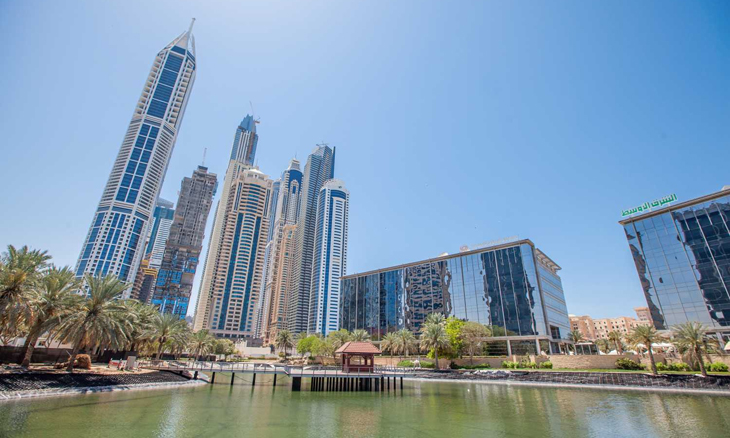Relocating to a new country is a significant decision. It’s even more so when you’re planning to start a business there.
The United Arab Emirates (UAE) has emerged as a top destination for entrepreneurs worldwide. Its strategic location, business-friendly environment, and robust economy make it an attractive choice.
But setting up a business in the UAE, particularly in Dubai, can seem daunting. The complex regulatory procedures and dynamic market conditions can be challenging to navigate.

This is where our comprehensive UAE relocation guide comes in.
Our guide aims to demystify the process of starting a business in the UAE. It provides a step-by-step walkthrough of the entire process. From understanding the local business environment to securing final regulatory approvals, we’ve got you covered.
Whether you’re an international entrepreneur, a business consultant, or a startup founder, this guide is for you. It’s designed to provide you with clear, actionable insights. These will help you successfully establish your business in the UAE.
We’ll delve into the different types of business licenses available in the UAE. We’ll guide you through the process of choosing the right legal structure for your business. We’ll also explain the UAE’s visa and residency requirements for entrepreneurs.
But that’s not all.
We’ll provide insights into the UAE’s labor laws and regulations for hiring employees. We’ll guide you on opening a corporate bank account. We’ll also discuss the role of local sponsors and service agents in setting up a business in Dubai.
Our goal is to make your journey to starting a business in the UAE as smooth as possible.
So, are you ready to embark on this exciting journey? Let’s get started.
Understanding the UAE’s Business Environment
The UAE’s business environment is renowned for its unique advantages, drawing entrepreneurs from around the globe. Its strategic geographical location offers access to key markets in the Middle East, Africa, and Asia.
UAE’s business environment is supported by an advanced infrastructure. This includes excellent transport networks and state-of-the-art telecommunications systems. All these factors provide a strong foundation for any business.
Additionally, the UAE government has implemented policies to foster a business-friendly climate. These policies include low taxation, economic diversification, and easy access to capital. Such a supportive framework encourages entrepreneurship and innovation.
Local customs and business practices are equally important in the UAE. An understanding of these practices is essential for successful business operations. Building relationships and networking are critical components of the UAE business culture.
To fully comprehend the UAE business environment, one must also explore its free zones. Each zone offers distinct benefits and is tailored for specific industries. These zones provide numerous advantages for businesses, particularly startups.

The Strategic Location and Business-Friendly Climate
The UAE’s location at the crossroads of East and West makes it an ideal business hub. It acts as a gateway to emerging markets and attracts global trade.
A strategic advantage includes direct shipping routes and efficient air connectivity. This geographic position facilitates swift trade routes and enhances export opportunities.
Moreover, the UAE’s business-friendly climate is well-supported by regulations promoting entrepreneurship. Streamlined business processes and robust legal frameworks empower foreign investors to thrive.
Local Customs and Business Practices
Understanding local customs is vital for succeeding in the UAE business landscape. The culture highly values trust, personal relationships, and face-to-face meetings.
Building strong connections with local partners requires cultural sensitivity. This includes showing respect for traditions, local customs, and language differences.
Cultural awareness is essential when negotiating and finalizing business deals. It’s vital to demonstrate integrity and transparency, aligning with the values upheld in the UAE.
Tax-Free Zones and Their Benefits
The UAE’s tax-free zones offer compelling benefits for businesses. Companies operating in these zones enjoy zero personal or corporate taxes.
Businesses in free zones can maintain 100% foreign ownership. This attractive proposition eliminates the need for local sponsorship and enhances operational freedom.
Moreover, free zones simplify business setup processes with fewer bureaucratic hurdles. This ease of operation encourages entrepreneurs to establish or expand their ventures.
These zones also offer state-of-the-art facilities, essential for specific industry needs. Overall, UAE’s tax-free zones provide a competitive edge, crucial for success in a dynamic market.
Setting Up Your Business in UAE
Establishing a business in the UAE involves careful planning and execution. You must understand the specific requirements and procedures to succeed. The process begins with choosing the right legal structure for your enterprise.
Selecting the correct legal structure is crucial. It influences your business operations, ownership, and liability. You have several options, including LLCs, sole establishments, and branches of foreign companies.
Once your legal structure is decided, you need to obtain a business license. The UAE offers various licenses based on activity and jurisdiction. Understanding the registration process and documentation is key.
Another critical aspect is meeting the visa and residency requirements. Entrepreneurs must secure the appropriate visas to reside and work in the UAE. This involves specific documents and approvals, which must be planned for.
Lastly, engaging local sponsors or service agents might be necessary. Their role varies depending on your business model and location. Understanding their obligations ensures compliance with UAE regulations.
Choosing the Right Legal Structure
The selection of a legal structure is vital when starting a business in the UAE. It impacts control, liability, and profit-sharing aspects. Several structures are available, suited to different business needs.
A popular option is the Limited Liability Company (LLC). It’s favored for its local trading capabilities and flexibility in operations. While requiring a local partner, it offers extensive business control.
For businesses wanting full control, free zone entities allow 100% foreign ownership. They’re an excellent choice for companies focused on exporting. However, they may have trading restrictions within the local market.
Finally, foreign companies may consider opening a branch or representative office. This structure allows for expansion without forming a separate legal entity. It provides operational flexibility while maintaining the parent company’s oversight.
Business License Types and Registration Process
Securing a business license is an integral step in setting up in the UAE. License types vary based on business activities and the chosen jurisdiction. Each type has specific regulations and criteria for eligibility.
The primary types include commercial, industrial, and professional licenses. A commercial license covers trade activities, while industrial licenses cater to manufacturing. Professional licenses are meant for service providers such as consultants and freelancers.
The registration process demands attention to detail. It includes submitting an application with required documents like business plans and feasibility studies. Notarized approvals, along with name reservation and initial approvals, are typical steps.
Timeframes for license issuance can vary. Often, the timeline depends on the accuracy and completeness of your documentation. Engaging a local consultant can expedite this process by ensuring compliance and addressing potential issues.
Visa and Residency Requirements for Entrepreneurs
For entrepreneurs, obtaining the appropriate visa is critical to business success in the UAE. The country offers several types of visas tailored for business owners and investors. Each visa type comes with distinct benefits and stipulations.
A popular option is the investor visa, often secured alongside business licensing. It allows multiple entries and paves the way for residency. Depending on your investment size and business type, different criteria may apply.
Additionally, the Golden Visa program offers extended residency for investors and entrepreneurs. It’s an attractive option for those with substantial investments. The process involves specific financial commitments and approvals.
Meeting residency requirements involves medical checks and Emirates ID registration. This administrative procedure is essential for legal living and working in the UAE. Understanding timelines and requirements is crucial to avoid disruptions.
The Role of Local Sponsors and Service Agents
Local sponsors or service agents often play a key role in the UAE business setup. Their involvement varies by business structure and location choice. Understanding their functions ensures alignment with UAE laws.
For mainland companies, a local sponsor might be required to own 51% of the business. While they hold the majority interest, operational control remains with you. These sponsors facilitate legal compliance and local navigation.
In contrast, free zone entities do not require local sponsors. Instead, service agents may assist in handling administrative processes. They ensure smooth operations by managing renewals and liaising with government departments.
Choosing the right sponsor or service agent is important. Consider their reliability, experience, and network. A strong partnership can enhance your market entry and overall business success.
Navigating Legalities and Regulations
To operate a business in the UAE, understanding the legal environment is paramount. The UAE has comprehensive laws to safeguard and govern business activities. Familiarity with these regulations ensures smooth operations and compliance.
Adhering to labor laws is crucial for hiring and managing employees. These laws are designed to protect workers’ rights and outline employer obligations. Ensuring compliance with local employment standards is essential for a harmonious work environment.
Opening a corporate bank account is another key step. It facilitates transactions and establishes credibility with stakeholders. The process requires specific documentation and banking knowledge unique to the UAE.
Intellectual property protection plays a pivotal role in safeguarding innovations. Securing patents and trademarks ensures your competitive advantage. Awareness of IP laws helps maintain your business’s unique offerings.
Finally, businesses must comply with Anti-Money Laundering (AML) regulations. These rules are in place to counter financial crimes. Staying informed about these requirements protects your business from legal penalties.

UAE Labor Laws and Hiring Employees
When hiring employees in the UAE, understanding labor laws is vital. These laws outline the rights and duties of both employers and employees. Familiarity with these regulations ensures your obligations are met.
Contracts are fundamental in employment relations. They stipulate terms like salary, duties, and leave allowances. Ensuring these agreements meet legal standards is a crucial business practice.
The UAE has specific criteria for termination and redundancy. Employers must follow due process, including notice periods and end-of-service benefits. Compliance with these requirements helps prevent legal disputes.
Moreover, recruiting foreign workers involves obtaining work permits and residence visas. Each step requires accurate documentation and adherence to immigration laws. This ensures the legality of employment and residency in the country.
Opening a Corporate Bank Account
A corporate bank account is essential for efficient business operations. It allows seamless financial transactions and separates personal and business finances. This separation is crucial for accurate accounting and financial management.
The application process entails submitting essential documents. Required documents may include your trade license, memorandum of association, and shareholder passports. Banks may also require additional proofs depending on your entity type.
Choosing the right bank is as important as opening the account. Banks differ in services, fees, and accessibility. Opt for a bank that aligns with your business needs and offers reliable customer support.
Moreover, maintaining transparency and regulatory compliance is important. This involves proper documentation of transactions and account statements. These practices ensure smooth banking operations and facilitate potential audits.
Intellectual Property Protection
Protecting intellectual property (IP) is crucial for maintaining competitive advantage. IP protection secures innovations, brand identity, and inventions. Understanding these laws helps safeguard your business interests.
Trademarks protect brand names and logos, preventing unauthorized use by competitors. Registering your trademark ensures its exclusive use in the market. This process requires proper documentation and adherence to local procedures.
Patents secure innovative products and processes, offering legal protection. Patent registration is a detailed process, demanding technological descriptions and thorough documentation. Securing patents prevents competitor imitations.
Copyrights safeguard creative works, such as media, literature, and software. They grant exclusive rights to creators, controlling distribution and reproduction. Adhering to copyright laws protects your content from misuse.
Compliance with Anti-Money Laundering Regulations
Compliance with Anti-Money Laundering (AML) regulations is crucial. These regulations aim to prevent financial crimes and ensure business transparency. Non-compliance can lead to severe legal repercussions.
Businesses must implement Know Your Customer (KYC) procedures. This process verifies client identities and assesses risks associated with business relationships. Proper KYC practices mitigate the risk of engaging with illicit entities.
Regular audits and transaction monitoring are part of AML compliance. They help detect suspicious activity, protecting businesses from fraudulent transactions. Staying vigilant ensures adherence to regulatory standards.
Additionally, staff training on AML laws promotes awareness and compliance. Employees must understand the importance of these laws and their roles in maintaining them. Regular updates ensure the business adapts to changing regulations.
Market Research and Funding
Before launching your business in the UAE, thorough market research is a must. Understanding the market dynamics and consumer preferences can greatly influence your success. Well-informed strategies are vital for competitive positioning.
Identifying target demographics aids in crafting tailored offerings. Different consumer segments have varied demands and purchasing behaviors. Recognition of these nuances helps in designing effective marketing campaigns.
Analyzing competition provides insights into industry standards and unique selling points. It helps in understanding what works and where gaps exist. Harnessing this information can give your business an edge.
Funding is another critical component for establishing your business. Entrepreneurs often seek external sources of finance for growth and stability. Ensuring a robust financial plan attracts potential investors and partners.
Understanding the Local Consumer Base
Understanding the local consumer base is crucial for success in the UAE. Consumers in this region exhibit diverse preferences influenced by cultural and economic factors. Adapting to these preferences is essential for business viability.
Conducting surveys and focus groups provides firsthand insights into consumer behavior. Direct feedback helps in refining products to better meet client needs. This data is invaluable in product development and marketing initiatives.
Consumer behavior in the UAE is also shaped by digital trends. With high internet penetration, online platforms serve as effective touchpoints. Leveraging digital marketing strategies can significantly enhance brand reach and engagement.
Additionally, local festivals and traditions impact consumer spending patterns. Seasonality plays a role in planning inventory and promotions. Recognizing these patterns leads to more informed sales strategies.
Securing Funding and Investment
Securing funding and investment is vital for business growth. Various options exist, from self-funding to external investors, each with distinct advantages. Choosing the right mix depends on your business goals and financial needs.
Angel investors and venture capitalists provide financial resources and strategic advice. They are particularly valuable for startups looking to scale rapidly. Building relationships with these investors requires a solid business plan and pitching skills.
Crowdfunding is another viable option for raising capital. It enables businesses to gather small contributions from a large number of people. Successful campaigns leverage social media and engaging storytelling.
Government grants and incentives can also support your financial needs. The UAE offers various programs to foster entrepreneurship. Staying informed about these opportunities can provide significant financial relief.
In summary, understanding your consumer base and securing funding are integral components of a successful business journey in the UAE. Careful planning and strategic execution in these areas pave the way for sustainable growth.
Leveraging UAE’s Free Zones
UAE’s free zones are pivotal for international businesses. These zones offer numerous benefits, making them attractive for startups and established firms alike. They facilitate smoother processes with various incentives tailored for business growth.
One standout feature is the 100% ownership rights they offer to foreign investors. This eliminates the need for local sponsorship, enhancing control over operations. It is a significant draw for investors looking for independence in business dealings.
Each free zone is tailored to specific industries, catering to businesses’ distinct needs. From technology to logistics, a range of sectors is supported by dedicated infrastructure. Selecting a suitable free zone aligns your business with the right resources and networks.
Regulatory frameworks within free zones promote ease of operations. These simplified rules reduce bureaucratic hurdles, speeding up business setup. Time and cost savings are realized, making it easier to enter the UAE market.
Overview of Free Zones and Their Advantages
UAE’s free zones are strategically located, leveraging the country’s geographic advantage. They serve as thriving hubs for international trade, connecting Eastern and Western markets. Proximity to ports and airports further amplifies their logistical appeal.
A tax-exempt status within these zones is a major advantage. Businesses enjoy exemption from corporate taxes and duties, enhancing profitability. This financial incentive is a prime motivator for selecting free zones over mainland.
The supportive business ecosystem within these zones fosters innovation. Networking opportunities abound with like-minded professionals and enterprises. Regular events and workshops provide avenues for knowledge sharing and growth.
Streamlined procedures for setting up and licensing new companies simplify the initiation process. The regulatory environment is designed to facilitate rapid establishment. Businesses can operationalize swiftly, minimizing downtime and allowing quick market entry.
Free Zone Business Setup Process
Starting a business in a UAE free zone involves several steps, each crucial for legal compliance. The process begins with identifying the right free zone that aligns with your business activity. Conducting thorough research ensures strategic alignment and future success.
Next, selecting a business license type relevant to your industry is essential. Options include trading, service, and industrial licenses, each catering to specific needs. The right choice ensures compliance and operational clarity.
Once the business type and license are chosen, documentation is prepared. This typically includes passport copies, business plans, and financial records. Accurate and complete documentation expedites approval and licensing.
Final approval from the free zone authority concludes the setup phase. Post-approval, businesses obtain legal certificates enabling operations. With these steps completed, a business can thrive within the advantageous free zone framework.
Networking and Business Support Services
Networking is vital for success in the UAE’s competitive market. Dubai, in particular, offers abundant networking opportunities. These interactions help entrepreneurs build valuable connections for business growth.
Business support services in the UAE enhance entrepreneurship by offering essential resources and guidance. These services play a crucial role in navigating the business landscape effectively. They assist in overcoming challenges that startups and established businesses may face.
Business incubators provide a nurturing environment for startups. They offer mentorship, funding opportunities, and access to industry experts. Incubators are instrumental in fostering innovation and accelerating growth.
The impact of a robust support system cannot be overstated. With strategic guidance and ample networking avenues, businesses can thrive in Dubai. Entrepreneurs are empowered to maximize their potential and achieve sustained success.
Business Networking Opportunities in Dubai
Dubai hosts numerous business events and forums, connecting entrepreneurs with peers and industry leaders. These gatherings are platforms for sharing ideas and exploring collaborations. They help build a strong foundation of professional relationships that drive business expansion.
Industry-specific conferences occur regularly, focusing on various sectors such as tech, finance, and retail. These events offer insights into emerging trends and technological advancements. Attending these conferences is valuable for staying updated and gaining industry knowledge.
Local chambers of commerce, like the Dubai Chamber, organize events promoting business interaction. They provide excellent networking opportunities with local businesses and authorities. Participating in these activities enhances market understanding and business prospects.
Social media and online platforms also serve as powerful networking tools. Business groups and forums enable interactions beyond geographical boundaries. Engaging in these platforms broadens your reach and fosters valuable connections.
Business Support Services and Incubators
Business support services are essential for navigating Dubai’s complex business environment. These services include legal advice, market research, and financial consulting. Utilizing them ensures compliance and strategic decision-making.
Dubai’s business incubators are vital resources for startups. They offer structured support in the form of mentorship, office space, and access to funding. This environment facilitates innovation and nurtures fledgling companies toward success.
Government initiatives, such as Dubai SME, provide support to small and medium enterprises. These programs offer financial assistance, training, and market access. They play a pivotal role in supporting entrepreneurship and economic diversification.
Collaborating with seasoned professionals through accelerator programs can be transformative. These programs focus on scaling businesses by providing expertise and networks. Engagement with these resources accelerates growth and enhances market presence.
Real Estate and Office Space in Dubai
Dubai’s real estate market is vibrant and diverse, offering a wide array of office space options. Understanding this market is crucial for establishing your business. With strategic planning, you can find a location that aligns with your business goals.
Each area in Dubai offers distinct advantages, from proximity to financial districts to logistical benefits. Careful consideration will ensure your business is positioned for success. Selecting the right location can significantly influence your market accessibility and brand visibility.
Navigating the real estate landscape involves understanding leasing terms, costs, and market trends. Engaging with experienced real estate agents can provide valuable insights. They can guide you through the complexities and help secure a favorable deal.
The selection of office space reflects your company’s image and operational needs. Modern facilities enhance employee productivity and client impressions. Ensure the office space is equipped with essential amenities and infrastructure.

Navigating the Real Estate Market
The Dubai real estate market is highly dynamic, with constant shifts in demand and supply. It is essential to research current trends and forecast future changes. This knowledge helps in making informed decisions about purchasing or leasing property.
Leasing terms can be complex, often involving long-term commitments. Understanding these terms is crucial to avoid unfavorable conditions. Consulting a real estate lawyer can ensure clarity and protect your business interests.
Engaging with reputable real estate agents provides a competitive edge. They offer expertise in property evaluation and negotiation tactics. Their insights are invaluable in securing the best value for your investment.
Location plays a pivotal role in determining operational efficiency and brand image. Consider factors like proximity to clients, suppliers, and essential services. The right choice enhances logistics and strengthens your market position.
Choosing the Right Location for Your Business
Selecting the ideal location is crucial for business success in Dubai. Each area offers unique benefits, from financial hubs to industrial zones. Align these location attributes with your business strategy and operational needs.
Consider the nature of your business when choosing a location. Retail businesses may thrive in bustling districts, while tech firms might prefer innovation hubs. The right environment supports growth and enhances customer engagement.
Accessibility is a key factor when deciding on a location. Ensure your office is easily reachable by public transport or main roads. Good accessibility boosts employee satisfaction and client convenience.
Evaluate the potential for expansion when selecting a location. Anticipate future growth and space requirements to avoid frequent relocations. A strategic choice now can save costs and efforts in the long term.
Cultural Considerations and Building Your Brand
Understanding culture and practicing good business etiquette in the UAE is crucial to success. Dubai is a multicultural city where respect for local customs is highly valued. Cultural sensitivity can build strong relationships with clients and partners.
Branding in Dubai requires blending international appeal with local understanding. Your brand should resonate with the UAE’s diverse yet unique market. A strong local presence can differentiate your business from competitors and attract loyal customers.
Adapting your communication style to fit the UAE’s business culture is vital. Awareness of cultural nuances can prevent misunderstandings and foster goodwill. Effective communication builds trust and enhances business collaborations.
A well-crafted brand strategy is essential for businesses looking to thrive in Dubai. Positioning your brand to reflect the values and aspirations of the local populace is key. This approach can lead to robust brand loyalty and growth.

Cultural Sensitivity and Business Etiquette
Demonstrating respect for the local culture and traditions is integral to conducting business in Dubai. Understanding social norms can enhance professional interactions and create favorable impressions. Respect is a cornerstone of successful business relations.
Business meetings often start with pleasantries. Be prepared to engage in small talk to build rapport. This step is important in establishing mutual understanding and respect.
Punctuality is highly regarded in the UAE. Being on time for meetings shows respect for your counterpart’s schedule. It also reflects your commitment and professionalism.
Dress codes in business settings tend toward formal attire. Dressing appropriately signals respect for the local business culture. It also reinforces your professional credibility and seriousness.
Establishing a Strong Brand Presence
Creating a compelling brand presence in Dubai involves understanding the local consumer mindset. Consumers in the UAE value quality, innovation, and status. Aligning your brand with these values can create a powerful connection with your audience.
Branding should encapsulate what makes your business unique and relevant. Differentiating factors need to be communicated clearly to stand out in a competitive market. A clear brand message increases customer recognition and trust.
Leveraging digital platforms is essential for reaching a tech-savvy market like Dubai. Effective social media strategies can enhance brand visibility and engagement. Tailoring content to local preferences can significantly increase its impact.
Partnerships with local influencers or organizations can amplify your brand’s reach. Building alliances with well-regarded entities can enhance your brand’s credibility. These partnerships can also provide access to broader audiences and insights into consumer behavior.
Conclusion and Final Thoughts
Relocating to the UAE and establishing a business can be a transformative opportunity. The country offers a dynamic market with potential for growth across various sectors. Understanding the local business environment is crucial to unlocking this potential.
Navigating the regulatory landscape involves understanding the nuances of UAE business practices. From selecting the right legal structure to securing licenses, each step is pivotal. Entrepreneurs can thrive by leveraging the strategic advantages Dubai offers.
Thriving in the UAE requires a blend of cultural insight and strategic planning. Businesses that integrate local values and innovations can establish a strong foothold in this vibrant market. With the right approach, the UAE presents a promising landscape for ambitious entrepreneurs.
Additional Resources
As you embark on your journey to start a business in the UAE, staying informed is key. There is a wealth of resources available to help guide you through the process.
Consider reaching out to the Dubai Chamber of Commerce for support and advice. Government portals can also provide valuable insights and the latest updates on regulations and market trends.


















